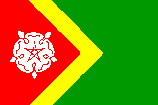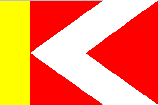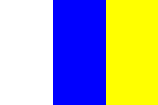- CHAKRA
- A wheel-like emblem that represents the Buddhist Dharma Chakra (or wheel of
law) and which appears in a variety of different designs on the national flag
of India, the military flags of Thailand and several other flags both past and
present.
![[chakra]](../images/v/vxt-d071.gif)
From left: India (fotw); Thailand (fotw)
- CHAMPAGNE
- See base.
- CHAPEL FLAG
- In US army usage a flag, bearing a device corresponding to a particular religion,
displayed in a military chapel.
![[US Chapel Flag]](../images/v/vxt-d073.gif)
Christian Faith Chapel Flag, US (fotw)
- CHAPLAIN'S FLAG
- In US army usage a flag, bearing a device corresponding to a particular religion,
flown in the field to designate the location of a chaplain's quarters or office,
or the site at which religious services are being held.
![[Jewish chaplain flag]](../images/v/vxt-d075.gif)
Jewish Faith Chaplains Flag, US (fotw)
- CHAPLET
- See garland.
- CHARGE
- 1) Generically, any emblem, object or design placed upon the field of a flag
or shield (see also Appendix IV).
- 2) Specifically, a symbol placed upon the field of a flag, which is neither an emblem as
specifically defined herein, nor a badge (see also
emblem,
emblem, national,
emblem military and
badge).
- 3) (v) The act of placing such a charge on a flag.
Please note however, that with a considerable degree
of heraldic justification, some sources propose the charge to be an integral part
of a flags design and usually not used separately, whereas, in general a badge
may. It is suggested therefore, that the entry badge
(in heraldry), and a suitable glossary or heraldic dictionary be consulted.
- CHARGED
- (adj) The act of having placed a charge on a flag (especially "charged with")
to have defaced with a charge (see also charge
and deface).
- CHECKERED FLAG
- See sports flag 4).
-
- CHECKY (CHECKERED, CHECKIE, CHEQUEY, CHEQUERED, CHEQUE, CHEQUES, CHEQUY or CHECQUY)
- 1) In vexillology, the term used for a flag (or sometimes a charge) bearing more than four but
an otherwise varied number of rectangles (usually but not invariably squares) in alternating colours
but see compony and counter-compony
(also charge 1) and quarterly).
- 2) In heraldry the term for a shield or banner of arms, or an ordinary/charge thereon, bearing (not less than
twenty) squares of a metal and colour alternately. - but see the notes below, compony and
counter-compony (also ordinary).
![[Checky - North Brabant Netherlands]](../images/v/vxt-d077.gif)
![[Checky - Chihuahua Mexico]](../images/v/vxt-d077a.gif)
![[Radvanice, Czech Republic]](../images/v/vxt-d077c.gif)
![[Example]](../images/v/vxt-d077d.gif)
From left:
Flag of North Brabant, Netherlands (fotw); Flag of Chihuahua, Mexico (Juan
Manuel Gabino Villascαn); Flag of Radvanice, Czech Republic (fotw); Example
(Parker)
Please note that in heraldry the exact number of squares (if more than twenty) is usually
left undefined, however, any number between ten and twenty squares is generally specified, and that in vexillology
the number of such rectangles (regardless of quantity) is often precisely regulated.


National Flag and Arms of Croatia (fotw)
Also please note that a shield or banner of arms carrying only nine squares
is called equipolle by French heralds.
- CHESSBOARD
- See checky.
- CHEVRON
- 1) On flags, any V shaped charge on a flag irrespective of the width of the arms.
The standard orientation of a chevron on flags is the same 2) below, however,
when the apex is towards the top edge of the flag it may be called a simple chevron;
with the apex towards the bottom edge of the flag, an inverted chevron; with the
apex towards the fly a horizontal chevron and with the apex towards the hoist
of the flag it may be called a reversed chevron (see also
inverted and
reversed).
- 2) In heraldry, the term for a charge with arms in the shape of a generally (but not invariably)
inverted letter V, and heraldic use frequently suggests that a chevron should have a width equal
to one-fifth the field of a banner of arms or shield (see also
party,
per chevron,
pile 2) and
reversed 2)).





From left: Example; Flag of Campina Grande, Brazil; Flag of Boelenslaan,
Netherlands; Flag of Otovice, Karlovy Vary; Czech Republic (fotw) ; Flag of
NAVA, US (fotw)
Please note with regard to 1) that the Editors have adopted a heraldic
model in defining a chevron on flags, however, please note also that there are
conflicting definitions with regard to the standard vexillological orientation of
a chevron and that usage of this term has not yet settled upon a consistent approach.
Please note with regard to 2) that a chevron may also be embowed -
see embowed.

Flag of Lamboing, Switzerland (fotw)
- CHEVRONEL
- A heraldic term used when two or more chevrons are displayed together on a shield or banner of arms, and heraldic use frequently
suggests that a chevronel should be one-half the width of a chevron (see chevron above).
![[chevronel]](../images/v/vxt-d080.gif)
Please note that in heraldry the standard orientation of a chevronel is the same as that of a chevron and that
variations of this standard may be described using the terminology given in 2) above.
- CHIEF
- A heraldic term for the top horizontal section of a shield or banner of arms,
however, heraldic use frequently suggests that a chief should be one-third of
the total depth of that shield or flag (see also
banner of arms,
base and
shield 2)).
![[chief example]](../images/v/vxt-d578.gif)
- CHRISTS KNIGHTS CROSS
- See cross of the order of the knights of Christ.
- CHRISTIAN FLAG
- One of a number of designs symbolizing Christianity, especially the white flag with a
blue canton containing a red Latin cross designed in 1897 by Charles Overton, and used by
various Protestant groups an ecclesiastic, ecclesiastical or church flag - but see
religious flag (also
church flag 2)).
![[Christian flag]](../images/v/vxt-d081.gif)

Charles Overtons Flag (fotw); The Anglican Catholic Church, US (fotw)
Please note that usage of the Charles Overton flag was
originally (largely) confined to the United States, but evidence of growing use elsewhere
has been reported.
- CHRISTIFERUS
- A medieval term, now obsolete, for the bearer of a standard, flag or banner
upon which the figure of Christ crucified was depicted.
- CHURCH BANNER
- See banner 3).
- CHURCH FLAG
- 1) See Christian flag and
religious flag.
- 2) In UK usage and some others, the flag flown from or outside a church;
particularly that flown from an Established (or Anglican) Church defaced with
the appropriate diocesan arms.
![[church flag example]](../images/v/vxt-d579.gif)
The Anglican Diocese of Chester (fotw)
- CHURCH PENNANT
- In US, UK and some other naval usage, the pennant hoisted aboard a warship
or naval shore establishment during religious services (see also
bethel flag and
flying angel flag).
![[Church pennant - UK, Netherlands]](../images/v/vxt-d083.gif)
![[Church pennant - US]](../images/v/vxt-d083a.gif)
Pennants, UK and The Netherlands (CS); US (CS)
Please note however, that in US usage this may also be called
a worship pennant, particularly when in connection with a non-Christian service.
![[Church pennant - Jewish worship pennant US]](../images/v/vxt-d083b.gif)
Jewish Worship Pennant, US (CS & fotw)
- CINQUEFOIL (CINQFOIL or CINQUE-FOYLE)
- The heraldic term for a charge in the form of a stylized flower having five
leaves and often pierced in the centre a quinterfoil or quintefeuille.


from left: cinquefoil example; Flag of the German Speaking Community, Belgium (fotw)
- CIPHER
- See monogram.
- CITATION FLAG (or PENNANT)
- See award flag.
- CITY FLAG
- See civic flag 1).
- CIVIC BANNER
- 1) See banner 3).
- 2) A term used when the flag of a municipality or urban area is a
banner of arms see civic flag (also
banner 1)).
![[civic banner example]](../images/v/vxt-d581.gif)
![[civic arms for banner example]](../images/v/vxt-d581a.gif)
Banner and Arms of the City of Birmingham, UK (fotw)
- CIVIC CROWN
- 1) The heraldic term for a closed garland or chaplet composed of oak leaves and acorns
(see also crown triumphal and
garland).
- 2) See mural crown 1).
![[civic crown]](../images/v/vxt-d085.gif)
A Heraldic Civic Crown (Parker)
- CIVIC FLAG
- 1) The flag of a municipality or urban area a municipal flag or city flag (see also
banner 4).
- 2) In UK usage, as above but also the sub-national flag of a county (see also
sub-national flag).
- 3) See civil flag.
![[civil example]](../images/v/vxt-d580.gif)
![[civil example]](../images/v/vxt-d580a.gif)
Flag of Ludwigslust, Germany (fotw); Flag of Northumberland County, UK (fotw)
- CIVIL AIR ENSIGN (or FLAG)
- That flag flown at civilian airports, landing fields and by civil air authorities
(see also royal air mail pennant).
Please note that in British use (and in that of
some Commonwealth countries) such a flag is called a civil air ensign (see also
air mail flag).
![[Civil air ensign - UK]](../images/v/vxt-d087.gif)
![[Civil air ensign - Pakistan]](../images/v/vxt-d087a.gif)
![[Civil air ensign - Ghana]](../images/v/vxt-d087b.gif)
![[Civil air ensign - Israel]](../images/v/vxt-d087c.gif)
![[Civil air ensign - Poland]](../images/v/vxt-d087d.gif)
From left: Civil Air Ensign, UK (fotw); Civil Air Ensign, Pakistan (fotw); Civil Air Ensign, Ghana (fotw);
Airport Authorities, Israel (fotw); Civil Air Flag, Poland 193032 (fotw)
- CIVIL ENSIGN
- See under ensign.
- CIVIL FLAG
- The version of a national or provincial flag that is for use by private citizens
on land (see also national flag,
official flag 2),
state flag,
civil ensign under ensign
and sub-national flag with
following notes).



From left: Civil Flag and National Flag of Guatemala (fotw); Civil Flag and
Official Flag of The Canary Islands, Spain (fotw)
![[Checky - North Brabant Netherlands]](../images/v/vxt-d077.gif)
![[Checky - Chihuahua Mexico]](../images/v/vxt-d077a.gif)
![[Radvanice, Czech Republic]](../images/v/vxt-d077c.gif)
![[Example]](../images/v/vxt-d077d.gif)







![[chevronel]](../images/v/vxt-d080.gif)
![[Christian flag]](../images/v/vxt-d081.gif)

![[Church pennant - UK, Netherlands]](../images/v/vxt-d083.gif)
![[Church pennant - US]](../images/v/vxt-d083a.gif)


![[civil example]](../images/v/vxt-d580.gif)
![[civil example]](../images/v/vxt-d580a.gif)
![[Civil air ensign - UK]](../images/v/vxt-d087.gif)
![[Civil air ensign - Pakistan]](../images/v/vxt-d087a.gif)
![[Civil air ensign - Ghana]](../images/v/vxt-d087b.gif)
![[Civil air ensign - Israel]](../images/v/vxt-d087c.gif)
![[Civil air ensign - Poland]](../images/v/vxt-d087d.gif)




![[chakra]](../images/v/vxt-d071.gif)
![[US Chapel Flag]](../images/v/vxt-d073.gif)
![[Jewish chaplain flag]](../images/v/vxt-d075.gif)

![[chief example]](../images/v/vxt-d578.gif)
![[church flag example]](../images/v/vxt-d579.gif)
![[Church pennant - Jewish worship pennant US]](../images/v/vxt-d083b.gif)
![[civic banner example]](../images/v/vxt-d581.gif)
![[civic arms for banner example]](../images/v/vxt-d581a.gif)
![[civic crown]](../images/v/vxt-d085.gif)